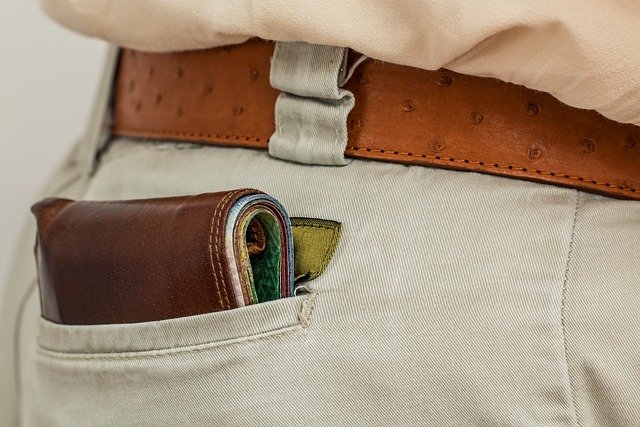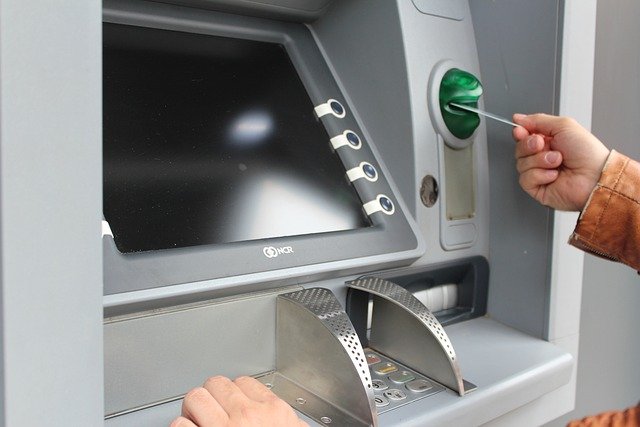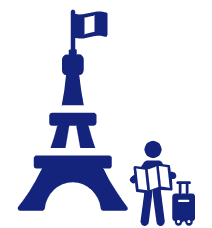
Paris is a dream destination, but it’s also a hotspot for scammers and their tricks. Paris scams are real. They catch you off guard. It can happen to anyone—it even happened to me once. I fell for the Paris bracelet scam, and within five minutes of leaning a Vélib’ bike against a wall, it was stolen.
Palais Royal in Paris
As you explore this enchanting metropolis and iconic landmarks like the Eiffel Tower or the Louvre Museum, it’s essential to equip yourself with knowledge to avoid falling victim to common scams in Paris.
Here’s the important part: I’m not saying Paris is a terrible, unsafe, or sketchy place. I’m not telling you to cancel your trip or to be afraid. What I’m saying is this: Paris, like any other major city in the world, has its share of con artists, scammers, and generally unethical people. These opportunists exist in New York, Sydney, London, Barcelona, and every other corner of the globe.
Paris attracts millions of tourists every year, thanks to its romantic atmosphere, incredible landmarks, and rich history. Unfortunately, like many other tourist hotspots, the city’s popularity makes it a hub for various scams targeting unsuspecting visitors. These scams, which exploit tourists’ unfamiliarity with local customs, can ruin an otherwise perfect vacation. Here’s a list of the most common scams in Paris and tips on how to avoid them.

1. Gold Ring Scam
You’re walking along the Seine River when an elderly woman suddenly stops you, pretending to hear the sound of something metal falling. She picks up a gold ring and insists that you dropped it. Even if you know it isn’t yours, she claims it’s valuable and urges you to keep it. However, she then demands money in return for letting you take it.
How to Avoid It:
If it isn’t yours, walk away without engaging. Don’t fall for such cheap tricks.

2. Fake Charity Collectors Scam
This scam is very common near the Eiffel Tower. A group of scammers works together in crowded areas, stopping tourists with clipboards featuring logos of legitimate charities. Often, they pretend to collect money for the deaf and mute, allowing them to avoid responding if confronted. However, the money they collect never goes to any real cause.
How to Avoid It:
Avoid anyone asking for cash donations on the street. Legitimate charities usually don’t solicit cash but instead collect contact information for future communication. If in doubt, walk away.

3. Friendship Bracelet Scam
Around Sacré-Cœur, especially in Montmartre, this scam is common. A friendly person will approach you, extend their hand as if offering a handshake, and, upon your response, swiftly tie colorful string around your finger to create a “friendship bracelet.” Once it’s done, they demand payment, leaving you caught in their trap.
How to Avoid It:
Be cautious while exploring tourist areas. Don’t shake hands with strangers, and keep your hands to yourself. If caught, quickly remove the string and firmly walk away.

4. Rose Scam
Though roses symbolize romance in Paris, they can also be a tool for scams. Someone may suddenly hand you a fresh rose, seemingly as a gesture of goodwill. In reality, they’ll immediately demand money for it. Even if you try to return the rose, they may persistently follow you, demanding payment.
How to Avoid It:
Don’t accept gifts from strangers. Just as you were taught as a child, the same applies to adults. Politely decline and walk away.

5. Metro Helper Scam
In the Paris Metro, some scammers pose as helpful individuals waiting for an opportunity. While you’re trying to understand maps or ticket machines, someone may approach you and offer assistance. They’ll propose to buy your ticket but, despite charging you for an adult ticket, hand you a child’s or expired ticket instead. This could lead to fines if caught by official metro staff.
How to Avoid It:
Always try to buy tickets yourself to ensure accuracy. If you’re struggling, ask for help with using the machine but avoid handing over money to anyone. Alternatively, go directly to the ticket counter. Never entrust strangers to buy tickets for you.

6. Beggar Scam
In Paris, begging isn’t always a scam, but it can often be a ploy to deceive tourists. Beggars usually position themselves near major tourist spots and train stations. Sometimes, a woman with a crying baby might approach you, or someone might display a dirty note describing their hardship. In extreme cases, a baby may even be forced to cry to evoke more sympathy.
How to Avoid It:
If you truly want to help, donate to a registered charity rather than giving money directly to beggars. This ensures your assistance reaches those in genuine need.

7. Pickpocket Scam
Pickpockets are active in crowded areas in Paris. They may “accidentally” bump into you or approach you disguised as a lost tourist asking for help with a map. These distractions are designed to shift your attention while they steal your wallet or purse. Popular spots like the Louvre are hotspots where pickpockets thrive on the busyness of tourists.
How to Avoid It:
- Carry minimal valuables and cash when visiting famous tourist locations.
- Keep important items in inner or zippered pockets.
- Always keep an eye on your belongings in crowded places.

8. Street Vendor Scam
Street vendors near Paris’s tourist spots can often become aggressive in trying to sell their products. They might act friendly and encourage you to look at or try their goods. However, the moment you show any interest, they may pressure you into paying for something, sometimes even demanding money forcefully.
How to Avoid It:
- Avoid engaging in any conversation or transaction with them.
- Politely ignore them if they offer you anything.
- Opt to buy souvenirs from shops or reliable locations instead.

9. Psychic or Fortune Teller Scam
On the streets of Paris, some psychics use their charm to deceive tourists. They might suddenly tell you, “You worry too much,” which can feel relatable. This is just the start of their scam. They then claim they can tell you deep truths about your life, such as your mother’s name or personal traits, to gain your trust. This “magic” usually ends with them asking for money.
How to Avoid It:
- Firmly say “no” and walk away without engaging.
- Don’t get involved in their conversation or give it any importance.

10. Shell Game Scam
The shell game is an age-old trick designed to scam people out of money. It’s usually played on a small table with three overturned cups, one of which hides a ball or dried pea. The scammer shows you the ball’s position, then shuffles the cups quickly. When you place a bet on where you think the ball is, their sleight of hand ensures the ball has “disappeared.” It’s a guaranteed losing game.
How to Avoid It:
- Stay away from these games or similar activities.
- Even standing nearby to watch others play can make you a target for pickpockets.
- Always be cautious and steer clear of such setups.

11. ATM and Credit Card Scam
Scammers in Paris may install skimming devices on ATMs to steal your card information and PIN. In some cases, they may pretend to assist you while attempting to obtain your card or PIN directly.
How to Avoid It:
- Use ATMs inside banks: They are safer compared to standalone ATMs on the street.
- Be cautious when accepting help: Never reveal your PIN or card details to strangers.
- Monitor your account regularly: Check your bank statements or mobile banking app for fraudulent transactions.
- Be alert for abnormalities: Avoid ATMs that appear to have extra devices or look tampered with.

12. Taxi Scam
Taxi scams in Paris often target tourists. Drivers may claim ignorance about your destination to overcharge you, take unnecessarily long routes to increase the fare, or pretend their meter is broken.
How to Avoid It:
- Use reliable taxi services: Opt for official taxis from designated taxi stands.
- Negotiate the fare upfront: If the meter is “broken,” agree on a price beforehand.
- Use ride-hailing apps: Services like Uber provide transparent and fair pricing.

13. Petition Scam
This scam is common near popular landmarks like the Eiffel Tower and the Louvre. Scammers, often pretending to be deaf or mute, ask you to sign a petition for a “noble cause.” They might use this distraction to pickpocket you or pressure you into donating money after you sign.
How to Avoid It:
- Don’t sign any petitions: These are typically part of a scam.
- Avoid interaction: Ignore the scammers and walk away quickly.

14. Restaurant Scam
Some restaurants in tourist-heavy areas may charge you for items you didn’t order, overcharge for substandard food, or include hidden service fees.
How to Avoid It:
- Seek local recommendations: Ask locals for suggestions on where to eat.
- Check online reviews: Look up ratings and reviews before selecting a restaurant.
- Review the bill: Always check your bill carefully to ensure there are no unusual charges.

15. Leaving Your Phone on the Table (Especially Outdoors)
In outdoor cafes or terraces, leaving your phone on the table can be risky. In busy cities like Paris, thieves on bikes or scooters can easily snatch your phone in seconds.
How to Avoid It:
- Keep your phone in a secure spot: Don’t leave it on the table; store it in your bag or on your lap where it’s visible and safe.
- Stay alert: Be mindful of your surroundings, especially in crowded places.
- Enjoy your time calmly: Keeping your phone secure allows you to enjoy your meal or drink without worry.
By following these precautions, you can safeguard yourself from scams and theft, ensuring a more enjoyable and stress-free experience in Paris.
